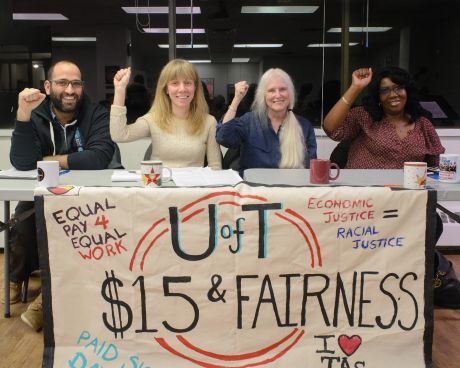Interviews
You are here
Climate economy: what could just transitions mean?

December 20, 2018
The Toronto Good Jobs for All (GJFA) Coalition is busy planning a round table in early 2019 that will involve unions and community groups in discussing next steps forward for just transitions to a sustainable climate economy. We spoke with Bruno Dobrusin from the Green Economy Network (GEN). He is part of the GJFA and is central in organizing the upcoming round table. He spoke to us as an individual and in his capacity with GEN.
What are the priorities for the Green Economy Network?
Bruno Dobrusin: We have four priorities. The first is to work federally to influence the political party platforms on climate, especially the climate jobs aspect in areas such as transportation, building retrofits and renewable energy. We are targeting the 2019 election. At a recent round table event in Ottawa we featured spokespersons from the Canadian Labour Congress (CLC) and the political parties. Though all were invited, the Tories did not participate. The NDP stated it would end fossil industry subsidies, support just transitions, and oppose pipelines.
Our second priority area, and the one that is most challenging, is working with our member organizations, especially unions, to energize their members around climate work. There is a big step between climate awareness and taking action. We discuss what unions can do and highlight what they are already doing that may not fit the current narrative about what constitutes climate jobs. For example the building trades are training members in building retrofits, but we don’t feature that enough in our discussions of climate jobs.
Thirdly, we organize round tables across the country. We involve organizations already lobbying for climate jobs, to develop a common platform. This can differ by location, for example the specifics in Ottawa are different than those of Alberta.
Lastly, we support existing GEN campaigns and its allies so there is no duplication. For example we support CUPW’s Community Power initiative, the Fight for $15 and Fairness, and Amalgamated Transit Union/ATU’s Keep Transit Public campaign.
What are the goals of local/regional round tables on just transitions?
One is to have different groups (labour, faith, environmental) interact with a focus on workers in climate adaptation and mitigation strategies, e.g. municipal workers dealing with floods, tradespeople who insulate buildings, anti-poverty groups like ACORN, and environmental groups. We could take the GJFA climate charter (developed for recent Ontario provincial and municipal elections) and discuss how to move that forward and engage politicians. So I am speaking with Fight for $15 and Fairness, the ATU, and CUPE municipal locals to speak on panels and then perhaps have a round table discussion on each of a variety of related topics.
If activists outside Toronto want to organize a similar round table in their own city could they contact you for resources?
Absolutely. We have had round tables so far in Winnipeg, Edmonton, St. John and Moncton and are planning one for Halifax. You can reach me via greeneconnet [at] gmail.com
GJFA co-chair Carolyn Egan adds, “The GJFA coalition is made up of labour, people of color organizations and environmentalists and is working to bring an equity perspective to discussions on just transition. We are involved in organizing to provide climate jobs for racialized youth with the Toronto Community Benefits Network and are hoping the round table will broaden the discussion on these important issues with rank and file workers and community members.”
Photo: Bruno Dobrusin (far left) speaks on just transition at a recent forum in Toronto.
Section:
Topics:










